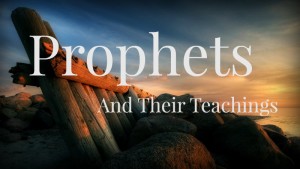Faith is both a simple thing and a very complicated thing. We create faith starting with a simple act of belief we are willing to act upon, but what happens in our lives once we have started down the road of faith is anything but simple.
As I was researching ideas on how to express some of my feelings about faith I came across this talk by Elder Neil L. Andersen, from the October, 2015 General Conference. I have pulled out 10 principles of faith found in his talk.
Faith, as a principle of power has the ability to significantly change our lives for the better. It is always for the better because faith can only be exercised in things that are true, which increases the amount of light in our lives, because spirit, light, and truth are, in many ways, interchangeable. Doctrine and Covenants 84:45 says this:
For the word of the Lord is truth, and whatsoever is truth is light, and whatsoever is light is Spirit, even the Spirit of Jesus Christ.
-
Faith is a substance
“Faith emits a spiritual light, and that light is discernible.” Ever wonder how the Savior was able to talk to someone and could tell how much faith they had? Refer back to D&C 84:45. The Spirit of Christ is light and truth. To Him it is a substance that can be measured, and he is the source of it. To Christ our faith is a perceivable substance. He can tell how much we have received and developed.
 In Moroni 10:11 faith is included in the gifts of the Spirit. “And to another, exceedingly great faith; and to another, the gifts of healing by the same Spirit.” In Luke 7:9 the Lord said of the centurion who wanted him to heal his servant:
In Moroni 10:11 faith is included in the gifts of the Spirit. “And to another, exceedingly great faith; and to another, the gifts of healing by the same Spirit.” In Luke 7:9 the Lord said of the centurion who wanted him to heal his servant:
When Jesus heard these things, he marveled at him, and turned him about, and said unto the people that followed him, I say unto you, I have not found so great faith, no, not in Israel.
-
Faith is a choice
“Faith in Jesus Christ is a gift from heaven that comes as we choose to believe and as we seek it and hold on to it.” We don’t start out with faith. Faith is created the first time we deliberately choose to believe in a principle of truth and act on that belief. We may not have any knowledge of that principle to start with, but even if we have just a desire to know if it is true, that is enough, as long as we are willing to act on that desire.
As has already been mentioned, faith is included in the gifts of the Spirit. It comes from God. Faith is not something we can manufacture on our own, it is a gift, freely given to us by our creator.
The pattern for exercising and growing faith is to choose to believe in a principle of truth, act on that principle until the truth proves itself to be true. At that point we now have knowledge that what we chose to believe in is in fact true. We know it is true because the Lord has blessed us with an added measure of light or intelligence that witnesses to our heart that we placed our trust in a good thing. Now that we have more light or knowledge than we had before we are equipped to exercise our faith in something more.
It is by this step by step progression that we grow our faith. Each time we exercise (use) our faith it is because we choose to believe in a principle of truth. It is that principle that we are putting to the test. The Lord wants us to prove all things that come from Him. 1 Thessalonians 5:21 – “Prove all things; hold fast that which is good.”
-
Faith fluctuates
“Your faith is either growing stronger or becoming weaker.” Faith is no different than our testimonies in that we are either moving forward and gaining greater knowledge or we have stagnated in our spiritual growth and we are regressing and losing spiritual knowledge.

Lost and Found
Look at someone who stops coming to church and no longer prays or studies their scriptures. Their faith begins to fade, and their understanding of the principles of the gospel are forgotten and have to be learned all over again. The Lord has always said that to him who has shall be given more, but to him who says, ‘I have enough’ shall be taken even that which he has. 2 Nephi 28: 29 – 30 says:
29. Wo be unto him that shall say: We have received the word of God, and we need no more of the word of God, for we have enough!
30. For behold, thus saith the Lord God: I will give unto the children of men line upon line, precept upon precept, here a little and there a little; and blessed are those who hearken unto my precepts, and lend an ear unto my counsel, for they shall learn wisdom; for unto him that receiveth I will give more; and from them that shall say, We have enough, from them shall be taken away even that which they have.
-
Faith is a choice
“You no longer stand on neutral ground. Your faith will grow not by chance, but by choice.” Once we have exercised our faith and learned of the truthfulness of the gospel of Christ, we have left neutral ground and are now responsible for what we have learned. At this point we know the law and will be held accountable for our obedience to it, based on what we know.
The important lesson here is that faith will not force itself on us at any point. Faith must be something we seek deliberately and conscientiously. We must choose to gain faith in the ways of the Lord. We must be seeking to not only intellectually know about His ways, but to understand them on a spiritual level as well.
-
How we live matters
“How we live our lives increases or diminishes our faith. Prayer, obedience, honesty, purity of thought and deed, and unselfishness increase faith. Without these, faith diminishes.”
 Faith is not just a matter of proving a point of the gospel. Once we learn about a principle of obedience or come to understand how something works, we must then live what we have learned or we will lose what we have gained. Remember that we are on an uphill climb, and letting go of that which we have gained will cause us to slide downhill. Once we have begun the ascent there is no turning back without losing a lot of time and energy in the process.
Faith is not just a matter of proving a point of the gospel. Once we learn about a principle of obedience or come to understand how something works, we must then live what we have learned or we will lose what we have gained. Remember that we are on an uphill climb, and letting go of that which we have gained will cause us to slide downhill. Once we have begun the ascent there is no turning back without losing a lot of time and energy in the process.
-
Questions are important
“Addressing honest questions is an important part of building faith, and we use both our intellect and our feelings. The Lord said, “I will tell you in your mind and in your heart.”” Don’t let others let you feel like a betrayer if you ask questions and express doubts. We don’t learn the truth if we never question.
The trick is to learn to ask the right questions. Asking the Lord to tell you how the ants were created is not going to get you any closer to being someone who can love like the Savior. But if you are asking how you can be forgiven, or asking to understand the doctrine of the Sabbath, etc. then you are going to be led to understand how these principles work and they will bless your life. Remember, the purpose of this life is to become what we need to become. Knowledge of creation and evolution, and things of that nature are not relevant to becoming like Christ. We’ll learn all that later. First things first, as they say.
-
Faith gives us strength to continue
“Faith never demands an answer to every question but seeks the assurance and courage to move forward, sometimes acknowledging, “I don’t know everything, but I do know enough to continue on the path of discipleship.”
Immersing oneself in persistent doubt, fueled by answers from the faithless and the unfaithful, weakens one’s faith in Jesus Christ and the Restoration.”
The importance of faith already gained is that it can help keep us on the path of discipleship when doubts start to gather around us and threaten our testimonies. The uniqueness of this principle is that it is important that we remember to balance our doubts with what we know.
 Sometimes our doubts can seem overwhelming. At these times we need to put some of them on the proverbial shelf and force ourselves to focus for a while on the things we already know to be true. More often than not we will find that we know enough truth that the things we were doubting are far outweighed by what we already know to be the truth.
Sometimes our doubts can seem overwhelming. At these times we need to put some of them on the proverbial shelf and force ourselves to focus for a while on the things we already know to be true. More often than not we will find that we know enough truth that the things we were doubting are far outweighed by what we already know to be the truth.
As an example, let’s go back to the accusations people make about Joseph Smith or Brigham Young, and so forth. People are clever and can make their accusations look very damning. But if we remember that we know the Book of Mormon is true then we also know we received it by a prophet of God. When we know that Joseph was a prophet we can let his behavior be between him and the Lord. If the Lord was unhappy with Joseph, do you really think He would have allowed him to continue as the prophet? Perhaps there are things we don’t know right now. Perhaps we should give Joseph, or Brigham, or whomever the nay sayers are complaining about, the benefit of the doubt. After all, we know they were prophets.
If we let the Spirit in to help guide us when we have doubts, He will help confirm to us what we have already learned. This will give us the strength to go on when others say we should give up.
-
Faith is increased by the word of God
“When was the last time that you read the Book of Mormon from cover to cover? Read it again. It will increase your faith.” This, all by itself, is a principle of power. The word of God has power in it. As we read the scriptures, especially the Book of Mormon, that power will flow into our lives and increase our ability to exercise faith.
-
Living oracles increase faith
“Another gift from God that enlarges our faith is the guidance of the First Presidency and the Quorum of the Twelve. … The guidance of the First Presidency and the Twelve help protect our faith.”
Sometimes we need some propping up when we are flagging or drooping spiritually. If we will turn to the living oracles of God, their words of encouragement and revelation can be a great source of strength and staying power to help us through our dark times. Trust them, for they love the Lord and they love us. They only want what is best for us. Study their words like you study the scriptures.
-
Our Faith determines our future
“President Thomas S. Monson said: “Fear not. … The future is as bright as your faith.”
Let us never underestimate the importance of developing faith. How far we go spiritually is directly related to how much faith we develop. We cannot become a spiritual giant with the faith of a pygmy. Faith is all about developing a relationship with God. As we learn to trust in the principles that make God what He is, we learn that those same principles and laws make us happier than we could have ever believed possible. We find that it is the ways of God that produce lasting joy.
There are so many things we need to learn, one at a time, to come to be like Christ. Each time we gain a little more of the light we receive when we test a truth, we step a little closer to being like Christ. As we learn to see the bigger picture and let the little things that really don’t matter go, we find that we feel freer than we have ever felt. Living a Christlike life becomes an exciting adventure. If you doubt me, go online and look at the apostles as they spend time with the Saints around the world. Look at their smiles. You can’t fake smiles like that. They are genuinely happy.
Final Thoughts

To read more of Kelly Merrill’s articles, click here.
There you have it. Faith starts with something as simple as a desire to believe then acting on that desire until you have received the proof of the truth. Truth is perceptible to the Lord. He can actually measure our faith by sensing how much truth we have tested and incorporated into our lives. Trippy, but true.
Faith comes from listening to and believing the Lord’s servants. It comes from studying the word of God in the scriptures. It can overcome doubts and give us the strength to move forward when we are surrounded by negativity. Faith is a living thing. Neglect it and it dies, feed it and it will grow and flourish.
To listen to Kelly’s accompanying podcast click here:
Kelly Merrill is semi retired and writes for https://gospelstudy.us. He lives with his wife in Idaho. His strength is being able to take difficult to understand subjects and break them down into understandable parts. He delights in writing about the gospel of Christ. Writing about the gospel is his personal missionary work to the members of the Church and to those of other faiths who are wanting to know more about Christ’s gospel and His Church.






